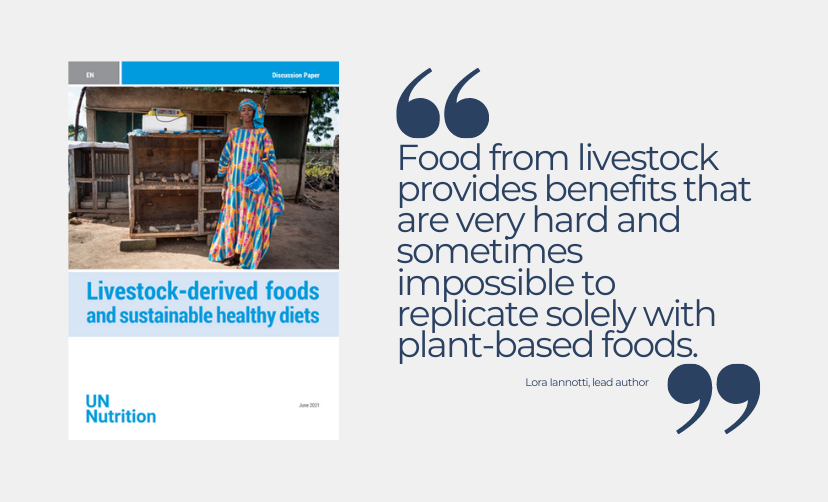New UN Nutrition Report highlights the importance of eggs in human health and development

In a new discussion paper released on 9 June, UN Nutrition emphasise the crucial role eggs play in sustainable balanced human diets. ‘Livestock-derived foods and sustainable healthy diets’ explores how the consumption of livestock-derived foods impacts human health, the environment and animal welfare.
As a widely consumed animal-sourced food, the egg is praised for its significant nutritional benefits, particularly in terms of human development and growth. The paper highlights the value the egg brings to infants, young people and pregnant women, particularly those in low-resource settings.
Leading experts explain that the nutrients eggs, meat and milk provide are more efficiently absorbed by the body than plant-based alternatives, helping address undernourishment which causes stunting in approximately 22% of young children worldwide.
Key findings
- Eggs provide critical nutrients and protect the health and wellbeing of vulnerable populations (Iannotti, 2018).
- The digestible indispensable amino acid score for protein quality exceeds 100% for eggs, compared with rice at 37% and wheat at 45% (FAO, 2011).
- Eggs have a high concentration of choline, a micronutrient vital to cell division, growth and membrane signalling (Zeisel and da Costa, 2009).
- Eggs are an important source of vitamins A, B12, D, E and folate, as well as bioavailable minerals, especially selenium, but also iron and zinc (Iannotti et al., 2014).
As part of the discussion, the implications of COVID-19 on global nutrition are explored: “The State of Food Security and Nutrition in the World (SOFI) 2020 estimates that healthy diets will be further out of reach for more than 3 billion people as a result of COVID-19 (FAO et al., 2020).” The paper uses this point to explain the added need for livestock-derived foods during this time of crisis.
Lora Iannotti, lead author of the report and director of the E3 Nutrition Lab at Washington University in St. Louis, said: “If we want to provide healthy diets for vulnerable children and pregnant or lactating mothers, which is where you see the worst impacts of malnutrition, the scientific evidence is clear: food from livestock provides benefits that are very hard and sometimes impossible to replicate solely with plant-based foods.”
She added that a child would need to consume at least 12 times as much of a plant-based alternative, such as carrots, to gain the amount of vitamin A available in a small serving of eggs.
Contributors to the discussion include the World Food Programme (WFP), the World Health Organization (WHO), the International Livestock Research Institute (ILRI), the Food and Agriculture Organization of the United Nations (FAO) and the International Fund for Agricultural Development (IFAD).
The paper concludes by exploring better ways to manage environmental, animal and human health risks, while still reaping the many benefits of the egg and other animal-sourced foods.
Read the full reportAbout UN Nutrition
UN Nutrition is a UN inter-agency coordination and collaboration mechanism for nutrition at global and country levels, providing support to governments for greater impact for children, women and people everywhere.
For more information, visit the UN Nutrition website.
Sources
FAO, IFAD, UNICEF, WFP & WHO. 2020. The State of Food Security and Nutrition in the World 2020: Transforming food systems for affordable healthy diets. Rome: FAO. (also available at https://doi.org/10.4060/ca9692en)
FAO. 2011. Dietary protein quality evaluation in human nutrition. Food and Nutrition Paper 92. Report of an FAO Expert Consultation, 31 March–2 April 2011, Auckland, New Zealand. Rome. (also available at http://www.fao.org/ag/humannutrition/35978-02317b9 79a686a57aa4593304ffc17f06.pdf).
Iannotti, L.L. 2018. The benefits of animal products for child nutrition in developing countries. Revue Scientifique et Technique (International Office of Epizootics), 31(1): 37–46. (also available at https://doc.oie.int/dyn/portal/index.xhtml?page=alo&aloId=36884).
Iannotti, L.L., Lutter, C.K., Bunn, D.A. & Stewart, C.P. 2014. Eggs: the uncracked potential for improving maternal and young child nutrition among the world’s poor. Nutrition Reviews, 72(6): 355–368. (also available at https://pubmed.ncbi.nlm.nih.gov/24807641/).
Zeisel, S.H. & da Costa, K. 2009. Choline: an essential nutrient for public health. Nutrition Reviews, 67(11): 615–623. (also available at https://pubmed.ncbi.nlm.nih.gov/19906248/).